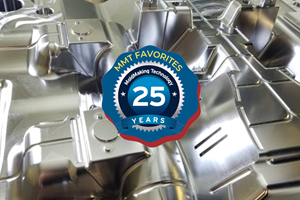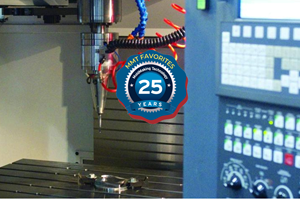MuCell Technology Helps Ford Win the Grand Award at the 41st SPE Automotive Innovation Awards
The Society of Plastics Engineers awarded Ford researchers the Grand Award for their work in utilizing the MuCell® process in the instrument panel for the brand new Ford Escape.
The Society of Plastics Engineers awarded Ford’s use of the MuCell process the Grand Award at the association’s 41st Auto Innovation Awards Competition, held November 9th at the Burton Manner, in Livonia, MI. The instrument panel was originally entered in the Process/Assembly/Enabling Technologies category. By creating the instrument panel structure for the new Ford Escape in microcellular foam, weight is reduced more than 1 lb, mechanical properties are improved, molding cycle time is reduced 15%, and molding clamp tonnage is reduced 45%, saving an estimated $3 US / vehicle vs. solid injection molding.
“Ford is focused on leveraging innovations in materials that help save weight and boost fuel economy, helping our vehicles travel farther on less gas,” said Derrick Kuzak, vice president of global product development. “MuCell is a great example of this effort.”
MuCell debuts in the instrument panel (IP) of the all-new Ford Escape, helping to reduce the weight of the IP. Weight savings of a little more than one pound may seem insignificant, but plastic parts are an area where it is particularly challenging to save weight without sacrificing strength, durability or function. This is the largest automotive component molded using the MuCell process and the first instrument panel to be molded in this process. The MuCell process has already been used successfully in Ford vehicles in Europe for valve covers, along with heating, ventilating and air conditioning (HVAC) systems.
“We are pleased that Ford recognizes the immense potential MuCell holds for vehicle cost and weight savings,” said Steve Braig, president and CEO of Trexel. We’re now working with Ford to apply the MuCell process in a strategic way for many more applications as they incorporate MuCell into their design guidelines.”
Overall vehicle weight affects fuel efficiency, a top purchase consideration for auto buyers. Yet consumers don’t want to give up comfort, convenience, performance, appearance or technology. So automakers must look at every aspect of a vehicle, from the smallest bracket to the engine that powers it for potential weight savings. Ford is committed to reducing vehicle weight between 250 and 750 pounds depending on vehicle line by 2020; increased use of high-strength steels, aluminum, magnesium and other platform efficiencies has already begun to meet these goals.
This innovative microcellular foaming technology saves petroleum as well as reducing overhead and energy costs by reducing the amount of time it takes to produce plastic parts.
The MuCell process is slated for use in the production of instrument panels, along with other applications, in future Ford vehicles beginning next year following its debut in the new Escape. The brand new SUV has 11 new exclusive features and fuel economy projected to top any vehicle of its kind on the market today.
About Ford Motor Company: Ford Motor Company, a global automotive industry leader based in Dearborn, Mich., manufactures or distributes automobiles across six continents. With about 166,000 employees and about 70 plants worldwide, the company’s automotive brands include Ford and Lincoln. The company provides financial services through Ford Motor Credit Company. For more information regarding Ford’s products, please visit www.fordmotorcompany.com.
About Trexel and the MuCell® Process: The MuCell® Microcellular Foam technology from Trexel Inc. is a complete process and equipment technology that enables the production of high quality plastic parts with significantly enhanced dimensional stability, lower weight/material and reduced cycle time. MuCell® technology involves the introduction of precisely metered quantities of atmospheric gases (nitrogen or carbon dioxide) in the plasticizing unit of an injection molding machine to create a microcellular material structure in the end product. The creation of these microcellular structures brings a wide array of benefits including an increased part quality along with reduced production costs.
Trexel, Inc. has led the development of the MuCell® Microcellular foaming technology and has pioneered many plastic processing solutions. Process deployment as well as equipment is supported by teams of highly qualified engineers through Trexel subsidiaries in North America, Europe, and Asia. For more information, please visit www.trexel.com.
Related Content
Making Mentoring Work | MMT Chat Part 2
Three of the TK Mold and Engineering team in Romeo, Michigan join me for Part 2 of this MMT Chat on mentorship by sharing how the AMBA’s Meet a Mentor Program works, lessons learned (and applied) and the way your shop can join this effort.
Read MoreLeading Mold Manufacturers Share Best Practices for Improving Efficiency
Precise Tooling Solutions, X-Cell Tool and Mold, M&M Tool and Mold, Ameritech Die & Mold, and Cavalier Tool & Manufacturing, sit down for a fast-paced Q&A focused on strategies for improving efficiencies across their operations.
Read MoreHow to Use Scientific Maintenance for More Accurate Mold and Part Troubleshooting
Discover how adopting scientific maintenance approaches helps improve mold lifespan, minimize failures, and optimize production outcomes.
Read MoreMachine Hammer Peening Automates Mold Polishing
A polishing automation solution eliminates hand work, accelerates milling operations and controls surface geometries.
Read MoreRead Next
Are You a Moldmaker Considering 3D Printing? Consider the 3D Printing Workshop at NPE2024
Presentations will cover 3D printing for mold tooling, material innovation, product development, bridge production and full-scale, high-volume additive manufacturing.
Read MoreReasons to Use Fiber Lasers for Mold Cleaning
Fiber lasers offer a simplicity, speed, control and portability, minimizing mold cleaning risks.
Read MoreHow to Use Continuing Education to Remain Competitive in Moldmaking
Continued training helps moldmakers make tooling decisions and properly use the latest cutting tool to efficiently machine high-quality molds.
Read More
















